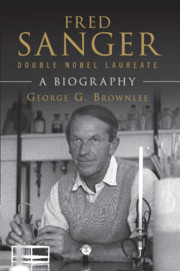Book contents
- Frontmatter
- Dedication
- Contents
- List of figures
- Foreword
- Acknowledgements and original sources
- Brief chronology
- Honours
- Introduction
- 1 A Quaker upbringing
- 2 How about studying insulin?
- 3 Radioactive sequencing of proteins and nucleic acids
- 4 Interview of Fred by the author in 1992: Early life
- 5 Interview of Fred by the author in 1992: Insulin and the Biochemistry Department, University of Cambridge
- 6 Interview of Fred by the author in 1992: Nucleic acids at the MRC Laboratory of Molecular Biology, Cambridge
- 7 Post-Sanger sequencing: high-throughput automated sequencing
- 8 Cancer: the impact of new-generation sequencing
- 9 Commentaries on Fred Sanger’s scientific legacy
- Epilogue
- Appendix: Complete bibliography of Fred Sanger
- Notes
- Index
- Plates
Introduction
Published online by Cambridge University Press: 05 November 2014
- Frontmatter
- Dedication
- Contents
- List of figures
- Foreword
- Acknowledgements and original sources
- Brief chronology
- Honours
- Introduction
- 1 A Quaker upbringing
- 2 How about studying insulin?
- 3 Radioactive sequencing of proteins and nucleic acids
- 4 Interview of Fred by the author in 1992: Early life
- 5 Interview of Fred by the author in 1992: Insulin and the Biochemistry Department, University of Cambridge
- 6 Interview of Fred by the author in 1992: Nucleic acids at the MRC Laboratory of Molecular Biology, Cambridge
- 7 Post-Sanger sequencing: high-throughput automated sequencing
- 8 Cancer: the impact of new-generation sequencing
- 9 Commentaries on Fred Sanger’s scientific legacy
- Epilogue
- Appendix: Complete bibliography of Fred Sanger
- Notes
- Index
- Plates
Summary
Fred Sanger asked me to interview him for the Biochemical Society archives in October 1992. He never told me why he chose me as an interviewer rather than one of his many colleagues and friends in Cambridge. I had worked with Fred in Cambridge from 1963 to 1980 but by 1992 had moved to the Sir William Dunn School of Pathology at the University of Oxford. Naturally I was honoured and accepted. In that interview Fred Sanger gave a full and frank account of his life and provided some insight into what qualities he thought were needed to be a successful scientist. This biography is, in part, based on that interview.
Fred had an unusual upbringing and it may surprise many readers to learn that he was not initially committed to research. As a young man he had a strict Quaker upbringing. He was ambivalent about studying medicine, changing his mind to study biochemistry rather than medical subjects at Cambridge because his father, a doctor in general practice, was always rushing around attending to patients and ‘could not really concentrate on anything’. Both his parents died when he was an undergraduate, leaving him vulnerable. He doubted he was good enough to do research and applied at the last minute to study for a higher degree, a PhD, in biochemistry at Cambridge only after he learnt he had been awarded, to his surprise, a first class degree. Sanger was a conscientious objector in the Second World War. He learned to do research rather than killing the enemy.
In spite of this uncertain beginning to his career, he quickly showed aptitude for research. He seemed to have the ability to succeed in solving ‘impossible research problems’ where others had feared to tread. He was a ‘hands-on’ researcher doing research himself with the help of a trusted technical assistant right up to the end of his career. Many of his critical research findings were the result of his own findings carried out personally. This did not mean he was not a good leader. In fact he was a consummate team leader and early on attracted others to his research team because of his achievements and the great personal effort he made. This personal commitment to research inspired confidence in his many collaborators, including me. He was also unusual in stressing the contribution of the whole of his research team.
- Type
- Chapter
- Information
- Fred Sanger - Double Nobel LaureateA Biography, pp. xxv - xxviiiPublisher: Cambridge University PressPrint publication year: 2014



